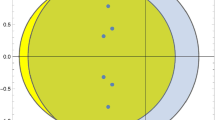Abstract
We generalize the IP-polynomial Szemerédi theorem due to Bergelson and McCutcheon and the nilpotent Szemerédi theorem due to Leibman. Important tools in our proof include a generalization of Leibman’s result that polynomial mappings into a nilpotent group form a group and a multiparameter version of the nilpotent Hales-Jewett theorem due to Bergelson and Leibman.
Similar content being viewed by others
References
V. Bergelson, Weakly mixing PET, Ergodic Theory Dynam. Systems 7 (1987), 337–349.
V. Bergelson, A. Blass, and N. Hindman, Partition theorems for spaces of variable words, Proc. London Math. Soc. (3) 68 (1994), 449–476.
V. Bergelson, H. Furstenberg, and R. McCutcheon, IP-sets and polynomial recurrence, Ergodic Theory Dynam. Systems 16 (1996), 963–974.
V. Bergelson, I. J. Håland Knutson, and R. McCutcheon, IP-systems, generalized polynomials and recurrence, Ergodic Theory Dynam. Systems 26 (2006), 999–1019.
V. Bergelson and A. Leibman, Topological multiple recurrence for polynomial configurations in nilpotent groups, Adv. Math. 175 (2003), 271–296.
V. Bergelson and A. Leibman, Distribution of values of bounded generalized polynomials, Acta Math. 198 (2007), 155–230.
V. Bergelson and A. Leibman, Polynomial extensions of van der Waerden’s and Szemerédi’s theorems, J. Amer. Math. Soc. 9 (1996), 725–753.
V. Bergelson and A. Leibman, Set-polynomials and polynomial extension of the Hales-Jewett theorem, Ann. of Math. (2) 150 (1999), 33–75.
V. Bergelson and R. McCutcheon, An ergodic IP polynomial Szemerédi theorem, Mem. Amer. Math. Soc. 146 (2000), no. 695.
V. Bergelson and R. McCutcheon, Idempotent ultrafilters, multiple weak mixing and Szemerédis theorem for generalized polynomials, J. Analyse Math. 111 (2010), 77–130.
H. Furstenberg, Ergodic behavior of diagonal measures and a theorem of Szemerédi on arithmetic progressions, J. Analyse Math. 31 (1977), 204–256.
H. Furstenberg, Recurrence in Ergodic Theory and Combinatorial Number Theory, Princeton University Press, Princeton, N.J., 1981.
H. Furstenberg and Y. Katznelson, An ergodic Szemerédi theorem for IP-systems and combinatorial theory, J. Analyse Math. 45 (1985), 117–168.
H. Furstenberg and Y. Katznelson, A density version of the Hales-Jewett theorem, J. Analyse Math. 57 (1991), 64–119.
H. Furstenberg and B. Weiss, Topological dynamics and combinatorial number theory, J. Analyse Math. 34 (1978), 61–85.
B. Green and T. Tao, The quantitative behaviour of polynomial orbits on nilmanifolds, Ann. of Math. (2) 175 (2012), 465–540.
B. Green, T. Tao, and T. Ziegler, An inverse theorem for the Gowers U s+1[N]-norm, Ann. of Math. (2) 176 (2012), 1231–1372.
N. Hindman, Finite sums from sequences within cells of a partition of N, J. Combinatorial Theory Ser. A 17 (1974), 1–11.
A. Leibman, Multiple recurrence theorem for measure preserving actions of a nilpotent group, Geom. Funct. Anal. 8 (1998), 853–931.
A. Leibman, Polynomial mappings of groups, Israel J. Math. 129 (2002), 29–60.
R. McCutcheon, FVIP systems and multiple recurrence, Israel J. Math. 146 (2005), 157–188.
K. R. Milliken, Ramsey’s theorem with sums or unions, J. Combinatorial Theory Ser. A 18 (1975), 276–290.
W. Magnus, A. Karrass, and D. Solitar, Combinatorial Group Theory: Presentations of Groups in Terms of Generators and Relations, Interscience Publishers, New York-London-Sydney, 1966.
J. J. Rotman, An Introduction to the Theory of Groups, Springer-Verlag, New York, 1995.
E. Szemerédi, On sets of integers containing no k elements in arithmetic progression, Acta Arith. 27 (1975), 199–245.
A. D. Taylor, A canonical partition relation for finite subsets of ω, J. Combinatorial Theory Ser. A 21 (1976), 137–146.
Author information
Authors and Affiliations
Rights and permissions
About this article
Cite this article
Zorin-Kranich, P. A nilpotent IP polynomial multiple recurrence theorem. JAMA 123, 183–225 (2014). https://doi.org/10.1007/s11854-014-0018-5
Received:
Published:
Issue Date:
DOI: https://doi.org/10.1007/s11854-014-0018-5




